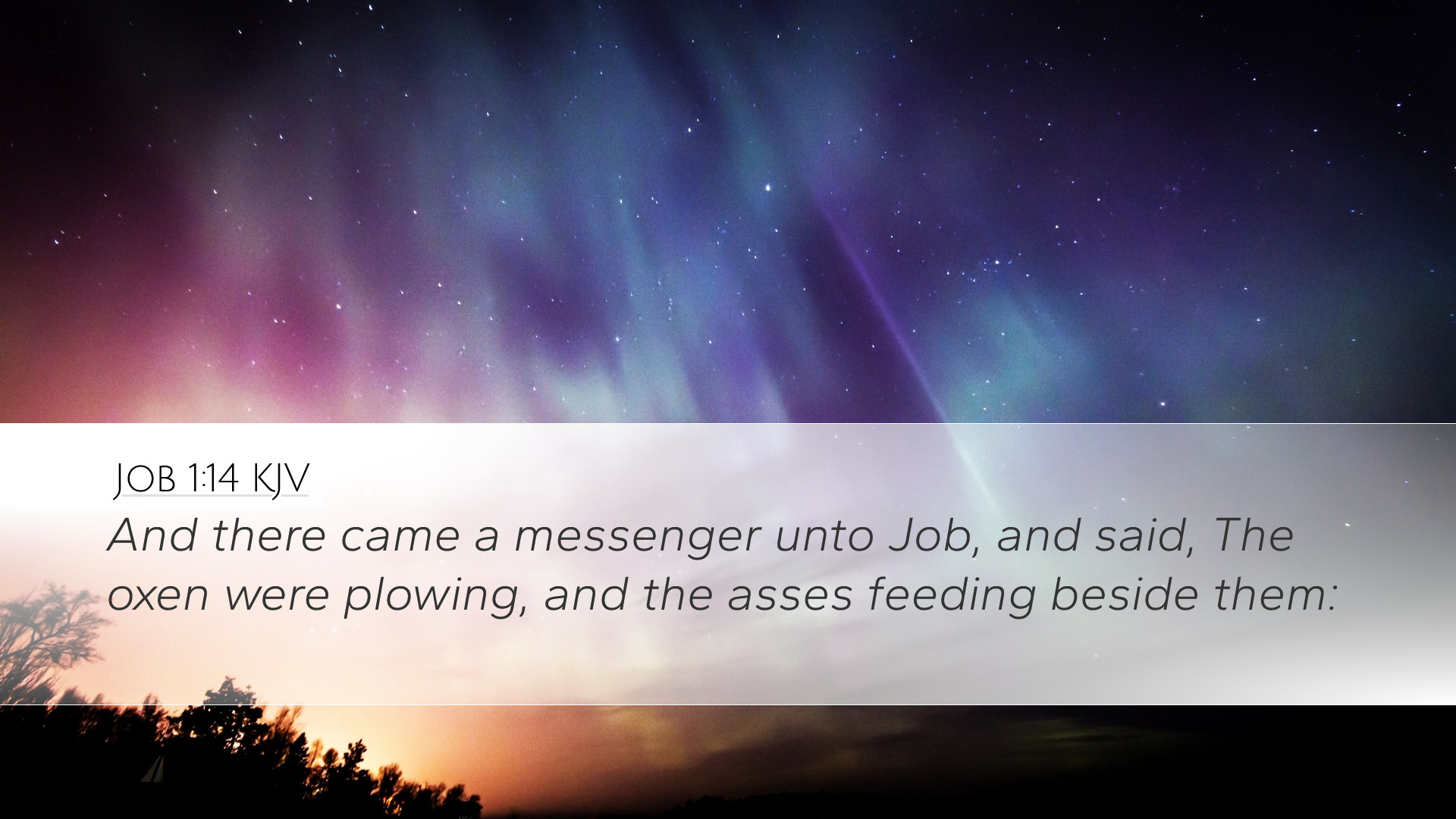Old Testament
Genesis Exodus Leviticus Numbers Deuteronomy Joshua Judges Ruth 1 Samuel 2 Samuel 1 Kings 2 Kings 1 Chronicles 2 Chronicles Ezra Nehemiah Esther Job Psalms Proverbs Ecclesiastes Song of Solomon Isaiah Jeremiah Lamentations Ezekiel Daniel Hosea Joel Amos Obadiah Jonah Micah Nahum Habakkuk Zephaniah Haggai Zechariah MalachiJob 1:14
Job 1:14 KJV
And there came a messenger unto Job, and said, The oxen were plowing, and the asses feeding beside them:
Job 1:14 Bible Commentary
Commentary on Job 1:14
Biblical Context: The book of Job presents one of the oldest narratives in Scripture, exploring profound themes of suffering, faith, and divine justice. Job 1:14 occurs in a section of the text that introduces Job's character as a righteous man and sets the stage for the trials he will face.
This verse states: "And there came a messenger unto Job, and said, The oxen were plowing, and the asses feeding beside them:" This message heralds the beginning of Job's calamities, and each messenger brings news that escalates his suffering.
Insights from Public Domain Commentaries
Matthew Henry’s Commentary
Matthew Henry emphasizes the suddenness of the messenger’s arrival, illustrating how swiftly calamity can strike, often without warning. He notes that the oxen and asses depicted here were essential to Job's livelihood, signifying that their loss would have immediate and dire economic consequences.
Significance of Livestock: In the agrarian society of ancient Israel, oxen were indispensable for farming, while donkeys were vital for transport and trade. Henry suggests that the loss of these animals is not merely a physical loss, but an attack on Job's status and stability within the community.
Albert Barnes’ Notes on the Bible
Albert Barnes provides a detailed exposition, pointing out the inclusiveness of the event’s impact. He notes the importance of the messenger's role—he is the bearer of news that disrupts Job’s tranquility. This messenger functions as God’s instrument, albeit an unwelcome one, bringing news that serves to illustrate the overarching theme of divine sovereignty over human affairs.
The Role of Messengers: Barnes suggests that the messengers symbolize the various forms of suffering that can invade the life of a righteous person while reinforcing the notion that such occurrences are allowed by divine decree. This illustrates the larger biblical principle that God is sovereign, even in the trials of His followers.
Adam Clarke’s Commentary
Adam Clarke provides a theological reflection on the nature of the calamity introduced in this verse. He points to the oxen and asses as representations of all the possessions and social standings that can be lost through divine testing. Clarke highlights that Job's losses were not random; instead, they were orchestrated to facilitate a testing of his faith and integrity.
Emotional and Spiritual Toll: Clarke notes the profound emotional toll such loss brings, stating that Job's suffering was meant to refine his character and faith. This verse initiates a series of losses that will challenge Job’s understanding of God’s justice and his own righteousness.
Theological Implications
This verse illustrates one of the foundational themes of the book of Job: the suffering of the righteous. Theologically, it serves as a reminder that fidelity to God does not preclude experiencing trials and tribulations.
- The Sovereignty of God: God permits suffering for reasons that may transcend human understanding, affirming His ultimate authority over creation.
- The Nature of Testings: Trials are often used as tools for spiritual development, and through Job, we see a man whose faith is tested to its core.
- The Role of Grace: Even in suffering, Job's responses demonstrate the overarching grace of God, allowing his faith to emerge as pure and refined rather than diminished.
Practical Applications for Pastors and Theologians
For pastors and theologians, Job 1:14 serves as a critical reflection point on the nature of suffering and God's providence. It invites a deeper discussion on how to minister within the contexts of suffering while reminding congregants of God's presence amidst their trials.
- Encouragement in Suffering: Pastors can offer comfort by reinforcing that hardships do not imply divine abandonment but rather can be a part of God’s purposeful plan.
- Teaching on Spiritual Warfare: Understanding the dimension of spiritual attacks reflected in Job’s experience can help congregants recognize and prepare for their own spiritual struggles.
- The Importance of Community Support: The role of messengers ultimately points to the need for community support in times of distress, emphasizing the church's role in encouraging one another.
Conclusion: Job 1:14 acts as a poignant reminder that the life of faith is often marked by incredible trials, but through these trials, believers can experience transformation and deeper intimacy with God. This commentary on Job can guide both personal understanding and pastoral application, enriching the spiritual lives of those who study it.


